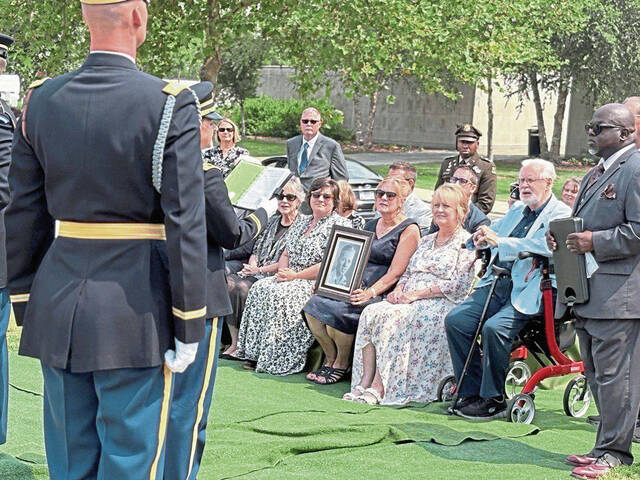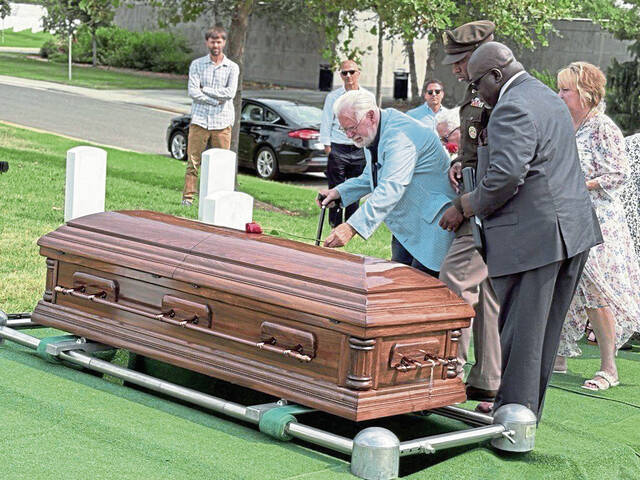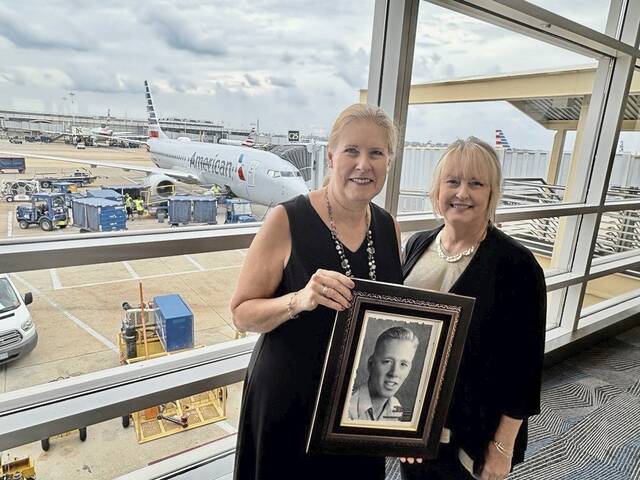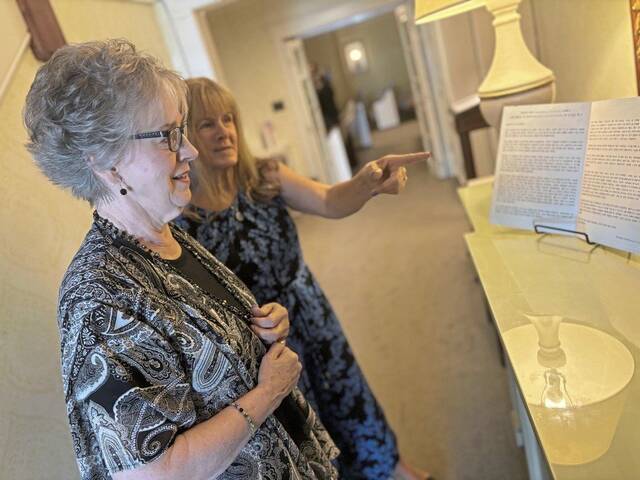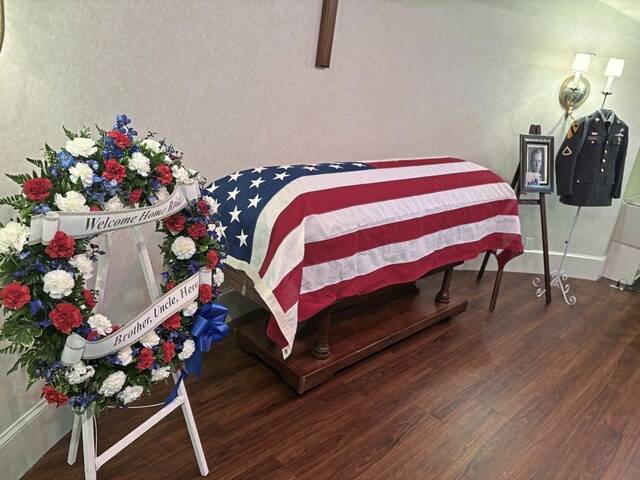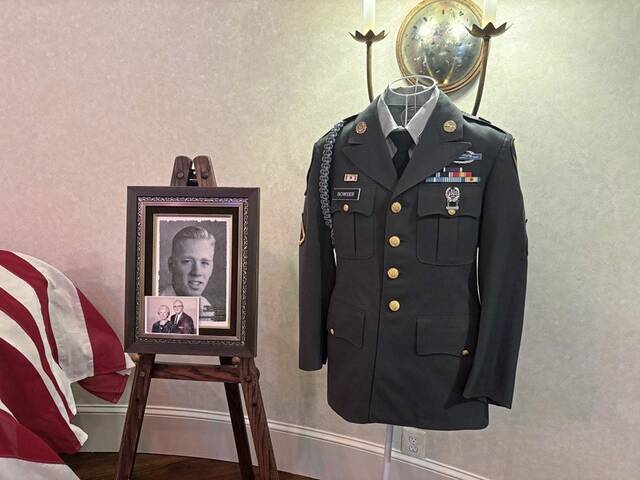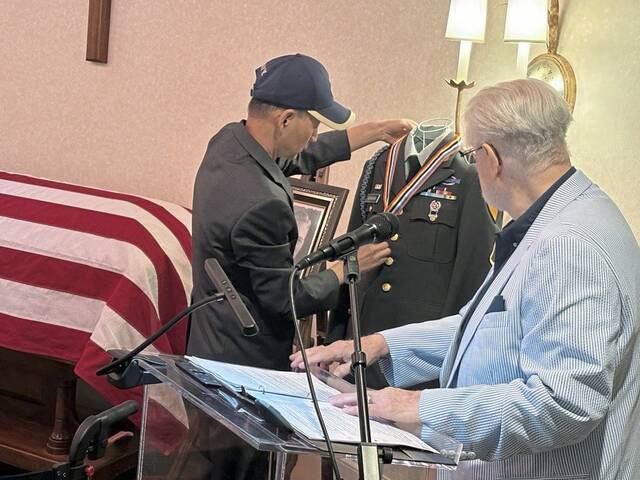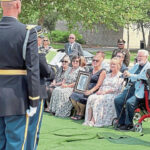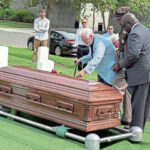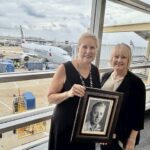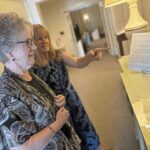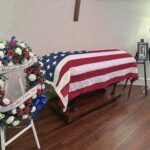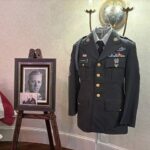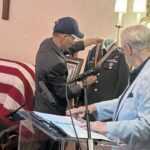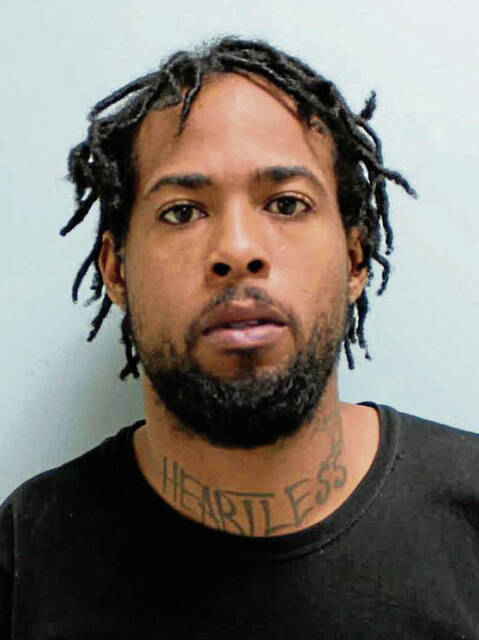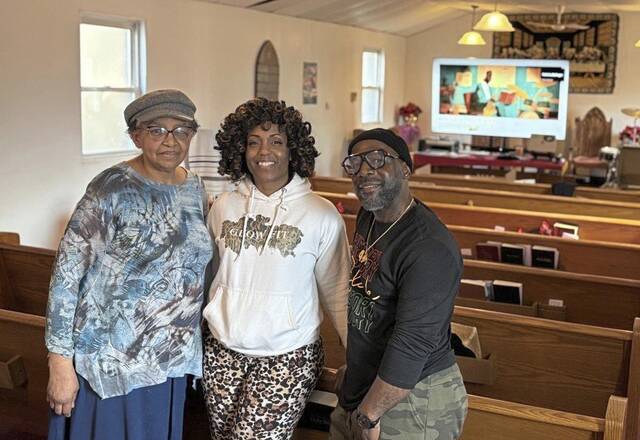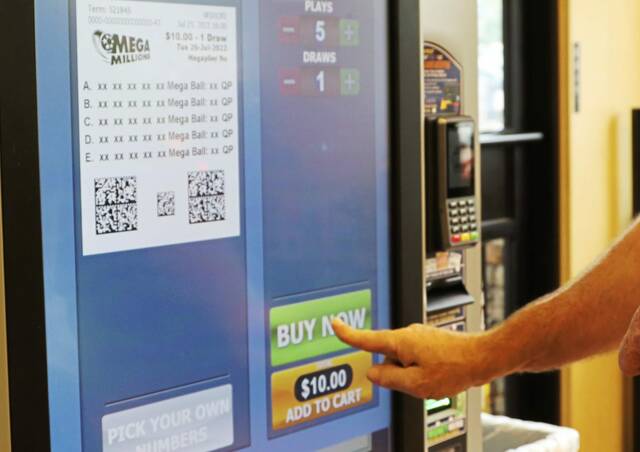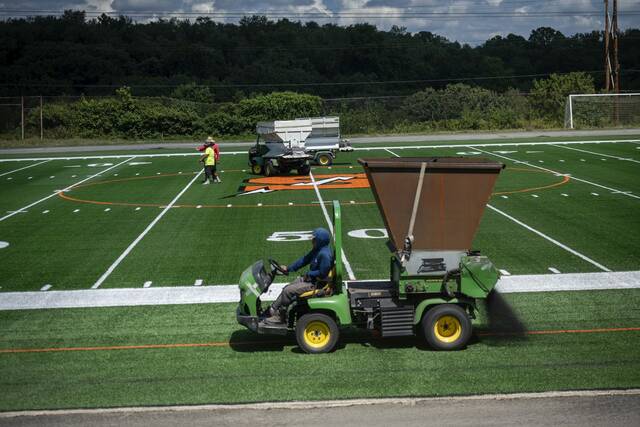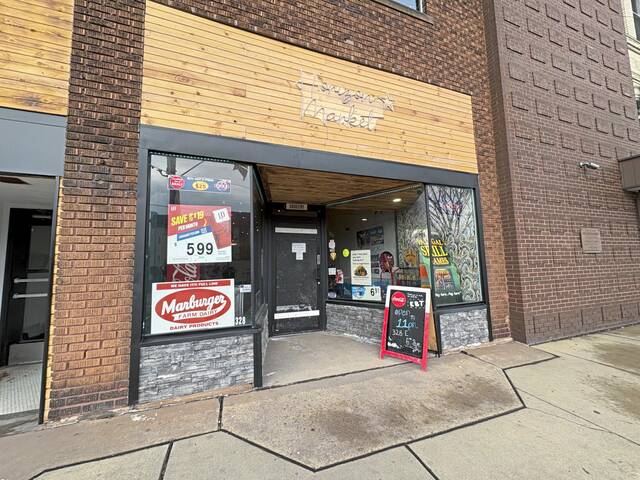For 75 years, Paul Bowser’s had the same last memory of his older brother, Roland.
It was in 1950, when Paul was 13. Roland marched down the front steps of his family home in Mount Vernon, New Kensington, hopped in a coupe with his girlfriend, Ruthann, and left to serve in the Korean War.
And that would be the last time the family ever saw Roland alive. He would die in the service in 1951 and, for three quarters of a century, his remains were never positively identified.
But on Wednesday, after years of waiting, praying and wondering, Paul, his sister Marjorie Ann “Marjie” Mahar and dozens of relatives from across the country waited on a tarmac outside as American Airlines Flight 1624 arrived into DCA Reagan Airport in Arlington, Va.
Paul’s grandson, Sgt. 1st Class Tristan Winter, escorted Roland home to Arlington from the National Memorial Cemetery of the Pacific — also known as the Punchbowl — in Honolulu, Hawaii.
An Army honor guard perfectly and precisely carried Roland’s casket into a hearse.
“Roland was home,” Paul said. “I waited 75 years to see him.”
***
Roland Bowser was born Feb. 24, 1931, the fifth of eight children born from Warren S. and Virginia M. Hobaugh Bowser of Keystone Drive, New Kensington.
A devout Christian, skilled athlete and musician, Roland attended Ken-Hi and completed his high school education after joining the Army by earning his GED at Fort Knox, Ky. in 1950.
That year, he was deployed to the Korean Peninsula, assigned to M Company, 3rd Battalion, 8th Cavalry Regiment, 1st Cavalry Division. He would write letters back home to keep in contact with his family.
On Nov. 22, 1950, the Bowser family received a telegram stating that Roland had been missing in action since Nov. 2.
About three years later, another telegram reported that, according to the Communist records, Roland had died while in their custody on June 5, 1951, in a North Korean POW Camp.
His whereabouts, until recently, remained a mystery.
***
The Bowser family would grow and move across the country.
Now, there’s family members living in at least 10 states, Marjie said. The only living siblings of Roland’s are Paul, 88, and Marjie, 77, of White House, Tenn.
In 2003, the Defense Department contacted the Bowser family, saying that they wanted to take DNA samples from Paul and Marjie, and put it into their database for possible future matches from unknown soldiers’ remains, Marjie said.
The following year, she and her family visited Washington, D.C. for updates from the government about their efforts to identify POW MIAs.
“We didn’t even know they were doing that,” Marjie remembered. “We were blown away by the information we got, and the families we met.
“Even back in 2004, we had the largest family group. Our whole family was excited that there was a possibility we could find Roland.”
Over the years, they would attend meetings across the country and even an event in Seoul, South Korea. At the beginning of each meeting, family members were encouraged to stand up and share stories of their loved one.
“It took all I had in me to stand up, at least the first two times, and then I had God saying to me, ‘Marjie, this is your chance to honor Roland. You need to do it.’”
***
Tenacious is the word Marjie’s family uses to describe her work in trying to bring Roland home.
“We’ve always heard about the story of (Roland), being in North Korea,” said Marjie’s daughter, Sharon Mahar Carter, of Waco, Texas. “We grew up with that story. And as you get older, you see the importance of family.”
Marjie would go on to speak at different events to carry on Roland’s legacy. Marjie and Paul attended a visited a heroes remembrance ceremony put on by the South Korean government in Seoul in 2019.
There, she read a letter she wrote to Roland, remembering the time the Bowser family learned he was killed, and reflecting on Roland’s sacrifice and the impact it had on the family, the country and the South Korean people.
Unbeknownst to the family, Roland’s unidentified remains were sent to Hawaii in 1956 and he was buried in the Punchbowl.
On Aug. 5, 2019, the Defense Department’s POW/MIA Accounting Agency disinterred those still unidentified remains. They were among the remains of 652 soldiers disinterred from the Punchbowl as part of the Korean War Disinterment Plan.
Fast forward to March 24 of this year: Marjie was scheduled to speak before the Tennessee House of Representatives, planning to read that same letter to Roland she had read at the remembrance in Seoul.
Three hours before doing so, she got notification that, through technology and forensic science, Roland’s remains had been identified. Paul said that 99% of his brother’s skeleton was intact.
While always holding hope, Marjie admits she’d wasn’t sure that day would ever come.
“We prayed it would,” she said. “I think I made peace with the fact it might not happen, but still held hope that it could.
It’s like Roland is providing a reunion for us. It’s his last gift for us — a big gift.”
***
Throughout the summer, Marjie became the family secretary: she connected the rest of the family to make arrangements to welcome Roland home off the plane Wednesday, followed by a funeral service at Adams-Green Funeral Home in Herndon, Va. and a graveside service with full military honors at Arlington National Cemetery on Thursday.
“When this came up, I said, ‘I have to go for my mom,’” said Linda Shields, of Plum. Her mother, the late Paula May Bowser Shields, was Roland’s sister.
“She loved her family,” Linda Shields said. “God has given us an opportunity to be with family I have not seen in 20, 30 years. I don’t know how anyone could pass that up.”
In some ways, Marjie said, Roland provided a reunion for the family.
“For the last 21 years of starting this procedure, finding my uncle (Roland,) never in my wildest dreams did I think we’d find his remains,” said Judy Bunch, of Little River, S.C. and Paula’s daughter and Linda’s sister.
“I truly believe God knew the time to bring us all together, and do a proper burial.”
***
At the funeral service, Paul read the names of his family members. When he called a name, that person was to stand up.
Each family of Roland’s siblings — Stan, Warren, Franklin “Jack,” Emma Jean, Paula, Paul, Joyce and Marjie — were represented.
“A man we never met brought us all together. … we live all over the place, but we all love each other,” Carter said. “The fact it has brought someone from every sibling of Roland’s — the families are represented — is amazing.
“It’s a great reminder to never give up hope.”
All told, Roland would have about 27 nieces and nephews, Marjie said. One of those nephews, the Rev. Dean Bowser, of Covington, Va., officiated some of the service. He emphasized the spiritual heritage of family and the comfort of knowing Roland being in heaven as a Christian.
“You don’t really get to be able to speak to this many of your relatives and share with them what the Lord meant to Uncle Roland and many of us,” Dean Bowser said. “It all began with my grandparents. Growing up, they went to the same church we went to. That’s how we got to know the family and the church experience.”
Marjie acknowledged that Aug. 7, 2025 would have been their mother’s 122nd birthday.
At the service, she read a letter to Roland — this time, with the comfort of knowing Roland’s final resting place.
“This is one of those days, Roland, that if God would only give you a glimpse of what is taking place, you would be in awe,” Marjie said. “This solemn celebration has given us a wonderful opportunity for a beautiful reunion and a little taste of what awaits us in heaven.
“The older Paul and I get, the closer we are to seeing you again. Thank you for bringing us all together.
“You are so loved and will forever be our hero.”
***
Roland’s service and sacrifice resounded from outside of the family, too.
Ben Chon, a Korean chaplain at the James E. Van Zandt Medical Center in Altoona, learned of Roland’s story and presented him with the Ambassador of Peace medal.
The medal is an expression of appreciation from the Korean government to living or deceased U.S. servicemen and women who served in the Korean conflict.
Often, the Korean War is referred to as the “forgotten war,” Chon said. Instead, it should be referred to as the “forgotten victory.”
Chon said Roland’s, and other Korean War veterans’, legacy has led to a thriving and free South Korea today.
“I’m here,” Chon said, “because (Roland) was there 75 years ago.”
Susan Kee, a Korean-born American and Phoenix, Ariz.-based historian, also felt prompted to reach out to Marjie after hearing the Bowsers’ story.
“There’s nothing we as Korean people can do to make up for the sacrifices Roland made, and the lifelong pain the family has carried with them,” Kee said. “We, as Korean people, realize we could not be alive or free without people who fought and died for our freedom. There’s nothing greater, in my mind, than people who lay down their lives for our freedom.”
***
Roland’s final resting place is in Arlington National Cemetery’s section 62, grave 849. Before the service, Marjie was able to embrace the anthropologist who last held Roland’s remains.
“All the ceremonies, and the preciseness of the military, that was so impressive,” Marjie said.
A Fairfax County Police escort guided the family from the funeral home to Arlington. During the Arlington service, uniformed military members presented Paul with an American flag and thanked the family for Roland’s sacrifice.
At the end, one by one, people placed a rose on Roland’s casket.
Marjie said she “doesn’t want to forget any of it.”
Paul agreed.
“It couldn’t have been scripted any better,” he said.
“We finally have closure.”


